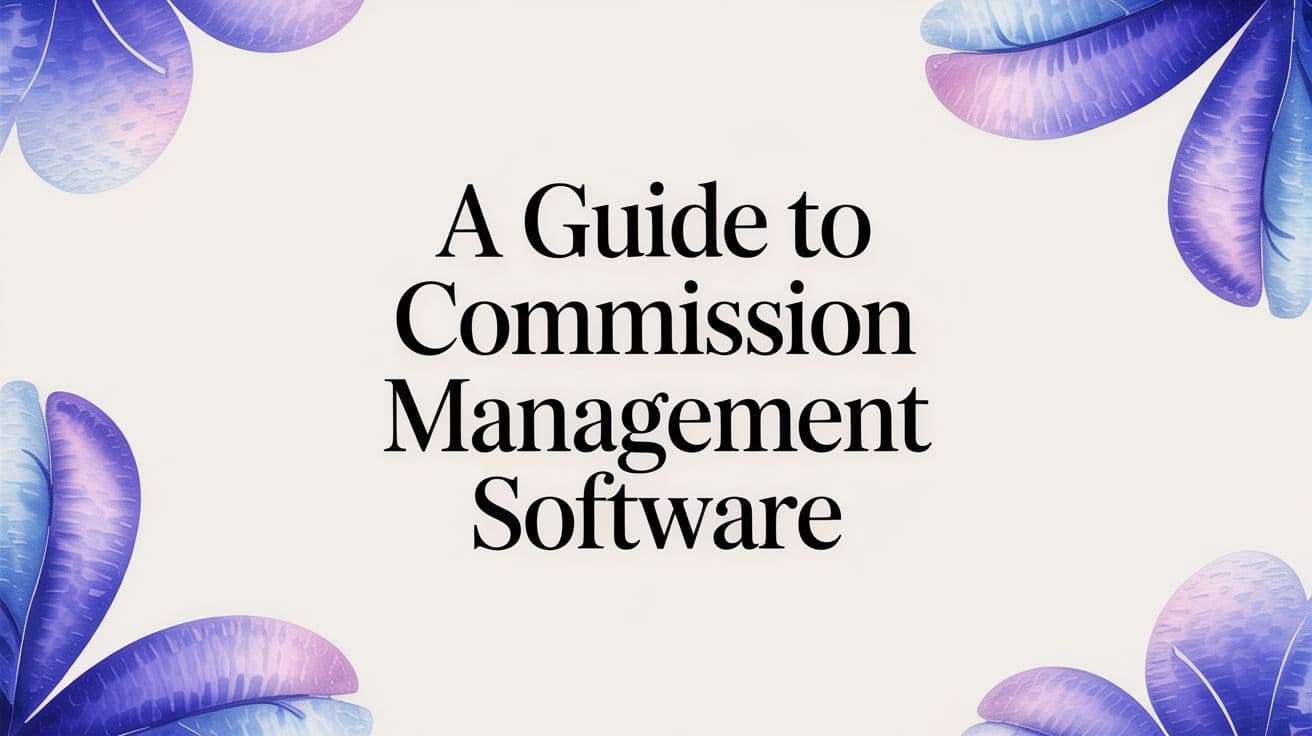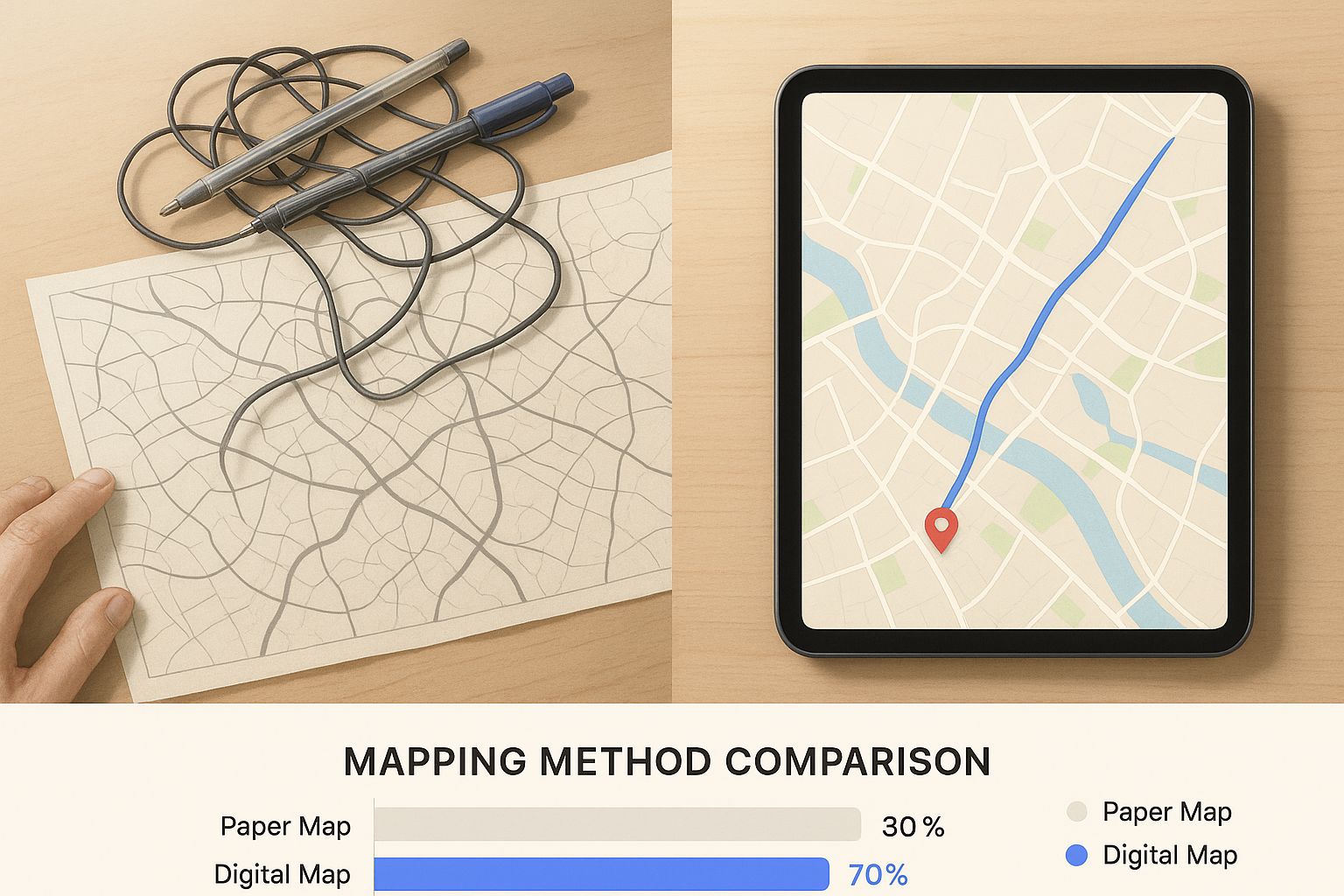A Guide to Commission Management Software
A Guide to Commission Management Software
Ollie Efez
October 19, 2025•16 min read

At its core, commission management software is a tool built to automate the entire lifecycle of sales commissions—from calculation and tracking all the way to the final payout. Think of it as the single, reliable source of truth that replaces tangled spreadsheets and painstaking manual data entry with a system that’s accurate, transparent, and fast.
From Chaos to Clarity
Ever tried navigating a new city with a crumpled, hand-drawn map? It’s confusing, slow, and you’re almost guaranteed to make a wrong turn. That’s exactly what tracking sales commissions manually feels like for your sales ops, finance teams, and especially your reps.
Commission management software is the modern GPS your business needs. It takes that chaotic, error-filled process and turns it into a clear, dependable system that everyone can trust. This isn’t just about making life easier; it’s a strategic move to build a more motivated and effective sales force.
The Headaches of Manual Tracking
When you’re stuck managing commissions by hand, a few persistent problems always seem to creep in, holding back your company’s growth:
- Costly Errors: It only takes one misplaced decimal in a spreadsheet to cause major issues. These simple mistakes can lead to significant overpayments or underpayments, which quickly erodes trust and hits your bottom line.
- Wasted Time: Finance and sales ops teams end up sinking hours and hours each month just trying to reconcile data, verify every single sale, and field endless questions from reps. That’s time they could be spending on work that actually moves the needle.
- Lack of Transparency: Reps often feel like they’re flying blind, unsure of what their next paycheck will look like. This uncertainty kills motivation and fosters a culture of disputes and shadow accounting. To get back to basics, you can check out our glossary entry on sales commission.
The image below perfectly captures the difference between the old, cluttered way of doing things and the clean, streamlined path that software provides.

This transition from a disorganized manual mess to a modern, automated system gives everyone the clarity and direction they need to perform at their best.
To truly grasp the difference, let’s look at a side-by-side comparison.
Manual Spreadsheets vs Commission Management Software
This table makes it clear: while spreadsheets might seem like a free and easy solution, they come with hidden costs in the form of errors, wasted time, and frustrated reps.The Shift to Automation
The market’s explosive growth shows just how badly businesses need a better way. The global commission management software market was valued at USD 2.47 billion and is projected to skyrocket to USD 4.5 billion by 2032. Companies are driving this expansion because they’re desperate to eliminate manual mistakes and speed up their payout cycles. You can dig deeper into these trends in the full report on commission management software growth.
A dedicated software solution provides a single source of truth. When finance, sales leadership, and individual reps all see the same real-time data, disputes disappear, and trust is built.
Ultimately, this kind of software is no longer a "nice-to-have." It has become an essential tool for any company that wants to operate efficiently, keep its top sales talent happy, and scale without being bogged down by administrative headaches.
Core Features Every Sales Team Needs

When you're shopping for commission software, you'll quickly find that not all platforms are created equal. While most promise to make things simpler, the truly great ones have specific, battle-tested features that solve real-world sales problems. It's like buying a car—sure, they all get you from A to B, but features like a solid navigation system and responsive handling make the entire experience better.
The heart of any good platform is its calculation engine. This is what frees you from the manual, error-prone world of spreadsheets. A robust system should be able to chew through your most complex commission structures without a hiccup.
This means it can effortlessly handle things like:
- Tiered Commissions: Automatically bumping up a rep's commission rate as they crush their sales goals.
- Split Payouts: Easily dividing the credit for a single deal among multiple team members.
- Clawbacks and Adjustments: Processing returns or contract changes without someone having to manually rework the numbers.
This kind of automation is a lifesaver, especially for businesses with layered revenue models. For a closer look, you can see how specialized tools handle recurring commission tracking for subscription businesses.
Real-Time Dashboards and Transparency
One of the biggest morale killers for a sales team is uncertainty about their earnings. Too often, reps feel like they're flying blind, waiting for a paycheck that might bring a pleasant surprise or a major disappointment. Good commission software fixes this with real-time dashboards.
These dashboards give every single rep a clear, live view of their performance, what they stand to earn, and how close they are to hitting their next target. This immediate feedback turns compensation from a mysterious back-office function into a powerful performance driver. When people can see a direct line between their hard work and their bank account, they're far more motivated to go out and close that next deal.
A single source of truth eliminates what I call "shadow accounting"—where reps keep their own side-spreadsheets just to make sure they're getting paid correctly. This builds trust and saves everyone a ton of time.
Seamless CRM and System Integration
Your commission data doesn't exist on an island. It's tied directly to your sales pipeline, customer records, and accounting books. That’s why seamless integration isn't just a nice-to-have; it's absolutely essential.
Any platform worth its salt has to connect directly with your CRM, whether that's Salesforce or HubSpot. This link ensures that all your commission calculations are based on the latest, most accurate deal information. No more exporting CSVs and manually importing data, which is where costly mistakes always seem to happen.
But it doesn't stop at the CRM. Look for platforms that can plug into your other core business systems, too:
- ERP Systems: Syncing payout information directly with your accounting software makes bookkeeping a breeze.
- Payment Processors: Connecting with tools like Stripe or PayPal lets you automate the final step of actually paying your team.
Creating this connected ecosystem allows data to flow smoothly from the moment a deal closes to the second a rep gets paid. This is what elevates a simple tool into a core part of your sales operations.
The Real Business Impact of Automating Commissions
https://www.youtube.com/embed/gI0Ns1X6NKY
Looking past the feature lists, the real magic of commission management software is how it reshapes your business from the inside out. Automating commissions isn’t just about making things run smoother; it’s about building a motivated, high-performance sales culture that actually drives growth.
Think about a fast-growing SaaS company for a minute. Their finance team is buried in spreadsheets, burning the first week of every month just to figure out payouts. At the same time, the sales team is getting antsy, second-guessing their checks and wasting precious selling time trying to track their own deals. That kind of friction breeds mistrust and burnout.
Now, imagine dropping a dedicated software solution into that environment. The entire dynamic flips. The finance team gets back dozens of hours, which they can now spend on strategic planning instead of tedious data entry. But the real transformation happens on the sales floor.
Boosting Motivation and Trust
When commission checks are transparent, accurate, and always on time, it completely changes how salespeople feel about their compensation. All that doubt and frustration? It gets replaced by clarity and confidence.
This direct, visible line between effort and reward makes a huge difference:
- Motivation on Tap: Reps can literally watch their earnings grow in real time. This constant, immediate feedback keeps them fired up to make that one extra call or close one last deal before the end of the month.
- No More Disputes: When everyone is looking at the same numbers from a single source of truth, payment arguments pretty much disappear. This builds a bedrock of trust between your sales team and the company.
- A Spark of Healthy Competition: Clear leaderboards and visible performance stats can kickstart some friendly competition, inspiring the whole team to level up their game.
This isn't just a small trend, either. The sales compensation software market was valued at USD 2.8 billion and is projected to hit USD 7.4 billion by 2033. The fastest-growing companies are already using these platforms to tie their sales incentives directly to their biggest business goals. You can dig into more data on the sales compensation software market to see where things are headed.
From Administrative Burden to Strategic Advantage
At the end of the day, automating commissions shifts the entire process from a reactive chore to a proactive, strategic part of your business. The hours you save are just the tip of the iceberg.
When your top performers aren't worried about whether their paycheck is correct, they can focus entirely on what they do best: selling. This shift in focus is where the real return on investment is found.
By eliminating manual errors and giving everyone total transparency, commission management software frees up mental space across the entire company. Finance can focus on forecasting, sales leaders can get back to coaching, and reps can concentrate on hitting their numbers. This alignment creates a more efficient, driven, and successful sales engine, directly connecting a software purchase to better morale and a healthier bottom line.
How to Choose the Right Commission Software
Picking the right commission software can feel like a massive project, but breaking it down into a few key steps makes it manageable. The secret is to start by looking at your own company first, not at flashy software demos.
Before you even look at a single vendor, map out your commission plans. Are they simple, single-rate structures? Or are you juggling multi-tiered payouts, complex overrides, and accelerators for your top performers? Be honest about what you have now and what you plan to build in the next 1-2 years. This single step will immediately filter your options.
Evaluate Core Technical Requirements
Next, you have to think about how this new tool will plug into everything else you use. Your commission software can't live on an island; it needs to talk to your other systems to work properly. Otherwise, you’re just creating more manual work for yourself. This is a big reason why spreadsheets fail—they can’t keep up with the real-time data flow that modern sales teams need. For more on this, check out this commission software market analysis.
Focus on these essential connections:
- CRM Integration: Your CRM (like Salesforce or HubSpot) is the source of truth for sales. The software absolutely must integrate seamlessly to pull deal data automatically. This is a deal-breaker.
- ERP and Accounting: Can it sync with your financial systems? A good connection here saves your finance team countless hours on reconciliation and bookkeeping.
- Payment Gateways: Look for integrations with platforms like Stripe or Paddle. This closes the loop and makes paying your reps on time much, much easier.
Focus on Scalability and User Experience
A platform that’s perfect for your 10-person sales team today might completely fall apart when you hit 50. Think about the future. Ask vendors how their systems handle more users, more data, and more complicated commission rules down the road. You don’t want to be shopping for a new solution in two years.
The most powerful software on the market is useless if your sales team won't log in. A clean, intuitive dashboard is just as important as the calculation engine running behind it.
Your reps should be able to see exactly where they stand and what they need to do to hit their next goal without needing a PhD in data science. A confusing interface just means more questions for your sales ops and finance teams, which is the exact problem you're trying to solve.
To get a quick estimate of what your commissions might look like, play around with our free SaaS commission calculator.
Finally, look closely at the reporting and analytics. Good software doesn't just cut checks; it gives you the insights to build smarter comp plans, spot your rising stars, and see if your incentives are actually driving the right behaviors. It should be a strategic tool, not just an accounting utility.
Getting Your New Commission System Up and Running

Rolling out a new commission management software isn't as simple as flipping a switch. You can't just turn it on and hope for the best. A successful launch needs a clear plan, great communication, and genuine buy-in from your team right from the start. If you rush it, you'll end up creating more headaches than you solve.
Everything starts with your data. Think of it like building the foundation for a house—if it's not solid, the whole structure will be shaky. Before you even think about migrating information, you have to dedicate serious time to data migration and cleaning. This is where you pull all your sales records from scattered spreadsheets, your CRM, and anywhere else they might be hiding and get them into one clean, consistent format.
This cleanup phase is absolutely critical. It ensures the software gives you numbers you can trust from day one and stops old mistakes from messing up your new, shiny system.
How to Stage a Successful Rollout
With clean data in hand, it’s time to configure the software to reflect how your business actually works. This is where you take your compensation plan—all those rules and tiers documented somewhere—and translate it into automated logic inside the platform.
A smart implementation follows a few key stages:
- Rule Configuration: This is the detailed work. You need to carefully input every commission tier, accelerator, bonus, and special condition. It's crucial to double-check that the logic perfectly matches the compensation agreements you have with your sales team.
- System Integration: Next, you connect the software to your other essential tools. Linking it directly to your CRM means deal data flows in automatically, which is a huge time-saver. An integration with your ERP or accounting software makes the final payout process seamless.
- The Pilot Program: Don't skip this. Before a company-wide launch, test the system with a small, trusted group of sales reps. This is your chance to catch any weird bugs or confusing parts in a low-stakes environment.
A pilot program isn't just a nice-to-have; it's essential. It lets you gather real-world feedback and iron out the kinks, making the final rollout for everyone else go much, much smoother.
The feedback you get here is pure gold. It helps you fix a misconfigured rule or a clunky dashboard element before it frustrates the entire sales floor.
Making Sure Your Team Actually Uses It
The final, and arguably most important, piece of the puzzle is communication. People get nervous when a new system is introduced, especially when it involves their pay. They'll naturally be skeptical if they don't understand why things are changing or how it benefits them.
Get ahead of this by being open and transparent through the whole process. Lay out the timeline clearly, provide hands-on training, and keep emphasizing how the new software gives reps more visibility and control over their earnings.
When your team sees the platform as a tool that helps them succeed, getting them on board feels like a natural next step, not a mandate from management.
Future Trends in Sales Compensation
The world of sales compensation never sits still, and the software that runs it is changing just as fast. We're moving beyond simple automation. The future is all about predicting what’s next and making compensation a more immediate, personal experience for sales reps.
One of the biggest shifts you’ll see is the deeper integration of artificial intelligence (AI) and machine learning. Tomorrow's commission software won't just be a calculator; it'll be a strategic partner. Imagine being able to model the real-world financial impact of a new comp plan before it ever goes live. Predictive analytics will show you exactly how a tweak might change sales behavior and, ultimately, your bottom line. This turns compensation from a backward-looking chore into a forward-looking strategy.
The Push for Real-Time Rewards
Think about how consumer finance apps work—instant updates, clear visibility. That expectation is bleeding into the workplace. Sales reps are tired of waiting a month or more to see what they've earned. The future is real-time payout visibility, letting reps track their commissions the moment a deal closes and even giving them the option to access their earned pay early.
Giving reps a real-time view into their potential earnings transforms a commission plan from a static document into a live, interactive motivator that drives daily performance.
When a rep can see their earnings tick up with every win, it keeps the motivation high, especially in a fast-moving sales cycle.
Adapting to a Modern Workforce
Sales teams and business models are getting more complicated, and compensation software has to keep up. The tools of the future are being built to handle these new realities head-on.
- Global Teams: Your software needs to effortlessly manage different currencies, local tax laws, and various payment systems for reps scattered all over the world.
- Usage-Based Models: For many SaaS companies, it's not just about the initial sale anymore. The best software can accurately calculate commissions based on customer consumption, feature adoption, or other non-traditional metrics.
It's no surprise that the market for these advanced tools is exploding. One analysis projects it will skyrocket from USD 2.5 billion to USD 7.8 billion by 2033, driven by this growing complexity and the power of AI. You can dig deeper into the growth of commission software to see what’s fueling this change.
Picking a solution that’s already built for these trends isn't just about keeping up—it's about making sure your compensation strategy remains a powerful competitive advantage.
Got Questions About Commission Software? Let's Clear Things Up.
Even when you see the potential, it's natural to have a few practical questions before jumping into a new system for commissions. Let's tackle some of the most common ones I hear from business leaders.
How Long Does It Take to Get Started?
This is probably the biggest question on everyone's mind. You're busy, and the last thing you need is a months-long IT project. The good news? Most businesses are fully up and running in just a few weeks. A good provider will walk you through a clear onboarding process that focuses on getting your data in and setting up your specific commission rules, making the switch surprisingly smooth.
Can It Handle Our Complicated Commission Rules?
"Our comp plan is... unique." I hear this all the time! And the short answer is, yes, modern commission management software is built for complexity. Whether you're dealing with accelerators for top performers, manager overrides, or multi-person split payouts, the software can handle that logic automatically. No more crazy spreadsheets and manual workarounds.
How Does This Actually Improve Team Morale?
This is where the magic really happens. Leaders often wonder how a piece of software can impact culture. It all boils down to two things: transparency and trust.
Imagine your reps having a live dashboard where they can see their earnings accumulate with every single sale. All those confusing disputes and side-spreadsheets they keep just to double-check their pay? Gone.
That kind of clarity is a powerful motivator. Compensation stops being a mysterious number that appears on a paycheck and becomes a real-time scoreboard. Reps can directly connect their hard work to their reward, which fuels a far more engaged and driven sales team.
When you remove the doubt and the administrative headaches, your team is freed up to do one thing: sell.
Ready to eliminate commission headaches and motivate your team? LinkJolt provides the tools you need to automate your entire affiliate and commission process with ease. Start tracking, managing, and paying commissions accurately at https://linkjolt.io.
Watch Demo (2 min)
Trusted by 100+ SaaS companies
Start Your Affiliate Program Today
Get 30% off your first 3 months with code LINKJOLT30
✓ 3-day free trial
✓ Cancel anytime